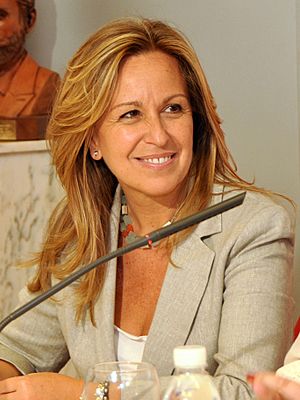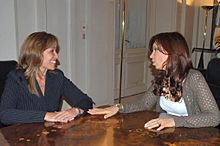Trinidad Jiménez facts for kids
Quick facts for kids
Trinidad Jiménez
|
|
|---|---|
 |
|
| Minister of Foreign Affairs and Cooperation | |
| In office 21 October 2010 – 22 December 2011 |
|
| Prime Minister | José Luis Rodríguez Zapatero |
| Preceded by | Miguel Ángel Moratinos |
| Succeeded by | José García-Margallo y Marfil |
| Minister of Health and Social Policy | |
| In office 8 April 2009 – 21 October 2010 |
|
| Prime Minister | José Luis Rodríguez Zapatero |
| Preceded by | Bernat Soria |
| Succeeded by | Leire Pajín |
| Member of the Congress of Deputies | |
| In office 13 December 2011 – 12 January 2016 |
|
| Constituency | Malaga |
| In office 1 April 2008 – 22 April 2008 |
|
| Constituency | Madrid |
| Personal details | |
| Born |
Trinidad Jiménez García-Herrera
4 June 1962 Málaga, Andalusia, Spain |
| Political party | PSOE |
Trinidad Jiménez García-Herrera (born 4 June 1962) is a Spanish politician. She has held important roles in the Spanish government. These roles include being the Minister of Foreign Affairs and the Minister of Health. Many people see her as a trusted advisor to former Spanish Prime Ministers Felipe González and José Luis Rodríguez Zapatero. She is also a member of the Inter-American Dialogue, a group that discusses important issues in the Americas.
Contents
Early Life and Education
Trinidad Jiménez was born in Málaga, Spain, on June 4, 1962. She was the third of nine children in her family. She studied law and earned her degree from the Autonomous University of Madrid.
Political Career and Public Service
Trinidad Jiménez is an expert in international relations. In 1983, while still a law student, she helped create the Socialist Students Association. She later joined the Juventudes Socialistas de España, which is Spain's Socialist Youth group. She was part of their International Relations Committee. A year later, she officially joined the PSOE, a major political party in Spain.
Early Roles and International Work
From 1984 to 1986, Jiménez led the International Relations Committee of Spain's Youth Council. She also served on its main committee. In 1989, she was the Spanish representative for a NATO Youth Exchange Program in North America. She also managed a department for new programs at the Spanish branch of the American Field Service. This organization helps students study abroad. Jiménez also worked for the office of the Secretary-General of the National Commission. This commission was set up to celebrate 500 years since the discovery of America.
Between 1990 and 1992, Jiménez lived in Equatorial Guinea. There, she worked as a Professor-Tutor in Political Law. She taught at the National Distance Education University (UNED) and at the Spanish College in Bata.

From 1996 to 2000, Jiménez was in charge of political relations with America for the PSOE's International Relations Secretariat. Starting in 1997, she also advised former Prime Minister Felipe González. He was leading the Global Progress Commission for the Socialist International. Later, she became the spokesperson for her political group on foreign affairs.
In 2003, Jiménez was chosen to run for Mayor of Madrid for the PSOE party. However, before the election, she was given a new role in the Foreign Ministry. She became Spain's Secretary of State for Ibero-America. This role focused on relations with countries in Latin America. In March 2008, she was elected to the Spanish Congress, representing Madrid. She resigned from this position after only one month.
Serving in the Spanish Government (2009–2011)
On April 7, 2009, the Spanish Prime Minister chose Trinidad Jiménez to be the Minister of Health and Social Affairs. In this role, she was responsible for healthcare and social policies in Spain.
Later, on October 20, 2010, Prime Minister Zapatero appointed her as the Spanish Minister of Foreign Affairs. She took over from Miguel Ángel Moratinos. As Foreign Minister, she met with important leaders, like Chinese Vice Premier Li Keqiang, during his visit to Spain in 2011. She also led talks with the United States about cleaning up Palomares. This site in Western Europe had radioactive material from a U.S. Air Force accident in 1966.
In 2014, Jiménez became the spokesperson for her political group in the Committee on Foreign Affairs. This committee is part of the Congress of Deputies. In this role, she supported a motion that asked the Spanish government to recognize a Palestinian state. This action was similar to calls made by lawmakers in Britain and Ireland.
Political Views and Stances
Trinidad Jiménez has expressed her views on various important topics. In 2010, she caused discussion when she stated that there were no political prisoners in Venezuela.
In February 2020, Jiménez joined about fifty former European prime ministers and foreign ministers. They signed an open letter published in The Guardian newspaper. The letter expressed concerns about a Middle East peace plan proposed by U.S. President Donald Trump. They believed the plan would not lead to a fair solution for everyone in the occupied Palestinian territory.
See also
 In Spanish: Trinidad Jiménez para niños
In Spanish: Trinidad Jiménez para niños
 | May Edward Chinn |
 | Rebecca Cole |
 | Alexa Canady |
 | Dorothy Lavinia Brown |

